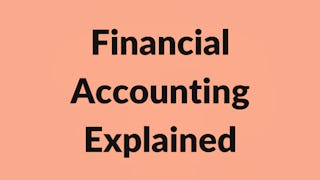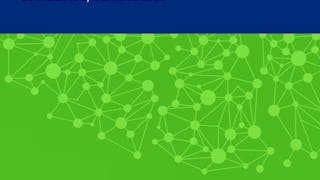The course builds on my Introduction to Financial Accounting course, which you should complete first. In this course, you will learn how to read, understand, and analyze most of the information provided by companies in their financial statements. These skills will help you make more informed decisions using financial information.



More Introduction to Financial Accounting
This course is part of Introduction to Finance and Accounting Specialization

Instructor: Brian J Bushee
62,927 already enrolled
Included with 
(543 reviews)
Skills you'll gain
Details to know

Add to your LinkedIn profile
7 assignments
See how employees at top companies are mastering in-demand skills

Build your subject-matter expertise
- Learn new concepts from industry experts
- Gain a foundational understanding of a subject or tool
- Develop job-relevant skills with hands-on projects
- Earn a shareable career certificate


Earn a career certificate
Add this credential to your LinkedIn profile, resume, or CV
Share it on social media and in your performance review

There are 6 modules in this course
Now that we have a solid grasp of the foundations from the Introduction to Financial Accounting course, we are going to work our way around the Balance Sheet to discuss various types of Assets, Liabilities, and Stockholders' Equity (along with their associated Revenues and Expenses) in more detail. We kick off with Accounts Receivable and the problem that some customers that buy goods on credit will not actually pay us. We will look at the computation, disclosure, and analysis of such "Bad Debts". We will also briefly discuss other Accounts Receivable issues such as Factoring and Securitization. Then, we will move on to Inventory. We will discuss how Inventory accounting differs between retail and manufacturing firms. We will see how companies figure out the cost of the inventory they sold, which requires assumptions about cost flows. This discussion will lead us into covering one of the most infamous accounting topics: LIFO.
What's included
8 videos1 reading1 assignment
This week, we will cover assets that represent longer-term investments. We will start with Property, Plant, and Equipment, covering questions like: What gets included in these accounts? How are they depreciated? What happens if their value is impaired? Then, we will cover similar questions for Intangible Assets, including Goodwill. Finally, we will discuss how companies account for investments in debt and equity securities and how the treatment for equity investments in other companies is determined by how much of the other company is owned.
What's included
8 videos1 assignment
We move to the right-hand side of the Balance Sheet this week with a look at Liabilities. We will start by covering time-value of money, which is the idea that $1 today is not worth the same as $1 in the future. Almost all liabilities involve a consideration of the time-value of money, so this will be an important foundation piece for you to understand. Then, we will cover accounting for bank debt, mortgages, and bonds. Next, we will move into the topic of "off-balance-sheet" liabilities with a discussion of Leases.
What's included
7 videos1 assignment
There are two certainties in life, and we will cover one of them this week (the other is beyond the scope of the course). We will NOT teach you how to prepare your own tax return. Instead, we will discuss how companies have to prepare "two sets of books": their financial statements and their tax returns. The rules are different for these two sets of books, leading to permanent differences and to temporary differences. We will cover both types of differences, with a main focus on "deferred taxes", which are the byproduct of temporary or timing differences between tax reporting and financial reporting. Finally, we will touch on other tax issues, such as Net Operating Loss Carryforwards and the rule that requires companies to disclose how much they are trying to cheat on their taxes (sorry, that should say "use tax planning strategies to manage their taxable income").
What's included
7 videos1 assignment
Our final week of new material ends at the bottom of the Balance Sheet: Shareholders' Equity. We will talk about issuing stock, repurchasing stock, Treasury Stock, stock dividends and splits, Accumulated Other Comprehensive Income, and stock-based compensation. We will also finally cover the fourth required financial statement: The Statement of Stockholders' Equity.
What's included
7 videos1 assignment
In the videos this week, I go through a systematic financial statement analysis for a company. There is no homework assignment for this material and it will not be explicitly covered on the exam (although some of the concepts are a review of material we have covered previously). Thus, if you don't have time before the final exam, you can enjoy these videos after completing the exam without adversely affecting your performance. The final exam will cover material in weeks 5 through 9. The only thing left to do after this exam is to impress your family, friends, and co-workers with your vast knowledge of Financial Accounting!
What's included
5 videos2 assignments
Instructor

Offered by
Explore more from Finance


Coursera Project Network


University of Pennsylvania


IESE Business School


University of Pennsylvania
Why people choose Coursera for their career




Learner reviews
543 reviews
- 5 stars
88.39%
- 4 stars
7.91%
- 3 stars
1.65%
- 2 stars
0.73%
- 1 star
1.28%
Showing 3 of 543
Reviewed on Mar 29, 2020
This is my first course in Coursera !!! I liked it soo much because our teacher is the most friendly and the assignments are too good !!! I successfully completed it!!!!
Reviewed on Jun 11, 2020
Professor Brian Bushee explains the concepts in a comprehensible and humorous manner! The course wouldn't be fun without the animated students :)
Reviewed on Feb 12, 2018
This entire course was very well done. I liked the professor and his virtual students. They asked (for the most part) relevant questions that added to my understanding.
New to Finance? Start here.

Open new doors with Coursera Plus
Unlimited access to 10,000+ world-class courses, hands-on projects, and job-ready certificate programs - all included in your subscription
Advance your career with an online degree
Earn a degree from world-class universities - 100% online
Join over 3,400 global companies that choose Coursera for Business
Upskill your employees to excel in the digital economy
Frequently asked questions
Access to lectures and assignments depends on your type of enrollment. If you take a course in audit mode, you will be able to see most course materials for free. To access graded assignments and to earn a Certificate, you will need to purchase the Certificate experience, during or after your audit. If you don't see the audit option:
The course may not offer an audit option. You can try a Free Trial instead, or apply for Financial Aid.
The course may offer 'Full Course, No Certificate' instead. This option lets you see all course materials, submit required assessments, and get a final grade. This also means that you will not be able to purchase a Certificate experience.
When you enroll in the course, you get access to all of the courses in the Specialization, and you earn a certificate when you complete the work. Your electronic Certificate will be added to your Accomplishments page - from there, you can print your Certificate or add it to your LinkedIn profile. If you only want to read and view the course content, you can audit the course for free.
If you subscribed, you get a 7-day free trial during which you can cancel at no penalty. After that, we don’t give refunds, but you can cancel your subscription at any time. See our full refund policy.
More questions
Financial aid available,

